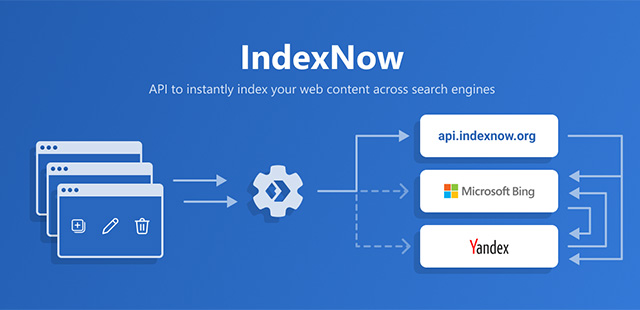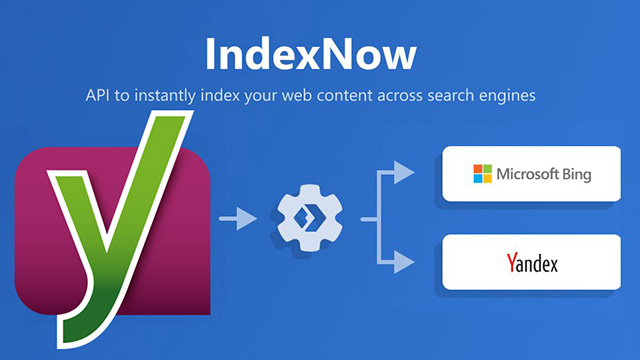SEO
Everything We Know About IndexNow So Far

Hopefully, you’ve heard about IndexNow at this point.
We covered its announcement in October and in December, I had Fabrice Canel, Principal Program Manager for Microsoft Bing, on the SEJ Show to talk about this revolution in how search engines discover new and updated content.
But what is it, exactly, and what do you need to know about it for SEO?
Here’s what we know so far.
Why We Need IndexNow
Search engines have been discovering content the same way for a long time.
Way back in 1993, JumpStation became the first internet discovery tool to send out bots to follow (or crawl) links from website to website and create a content map, or index.
Within the next few years, other search engines adopted this process as a way to find new content.
This process was included in an algorithm that also considered content, relevancy, and other factors – and search engine optimization as we know it was born.
It didn’t take long before SEO-savvy web publishers recognized the importance of indexing in securing high search engine rankings. In fact, without indexed content, a website won’t generate organic traffic.
But therein lies the rub: Unless you’re a large, highly trafficked website, it may be days or even weeks before a search engine crawls your site and indexes new pages. Heck, even if you are a large ecommerce site or marketplace, it may take engines weeks to pick up new arrivals or out of stock products as well – especially when depending on discoverability with basic crawls.
Meanwhile, you may have lost important traffic to competitors.
To streamline this process, Microsoft Bing released a new initiative in October 2021 called IndexNow.
So What Is IndexNow?
IndexNow is an open-source protocol that allows website publishers to instantly index across participating search engines, updating results based upon the latest content changes.
Simply put, it’s a simple ping that notifies search engines that a URL and its content have been added, updated, or deleted.
By eliminating the need for exploratory crawls, IndexNow seeks to improve overall internet efficiency.
How Does IndexNow Work?
There are two different ways search engines obtain index data: Pull and push.
Pull indexing occurs when a search engine visits your site to request web pages and gathers data from the server.
This is how search engines traditionally operate.
Push indexing is when the web publisher or content management system notifies the search engine that pages have been added or deleted or other changes have been made.
That’s what’s truly groundbreaking about the IndexNow – it allows all URLs submitted to any IndexNow-enabled search engine to be simultaneously submitted to all the other search engines using the protocol.
You can read more about the technical aspects of how IndexNow works here.
Which Search Engines Use IndexNow?
At the time of publication, Bing and Yandex are using IndexNow.
A handful of others are reportedly testing the protocol, according to an unnamed expert.
So far, DuckDuckGo has not announced any plans to adopt IndexNow.
However, it’s worth noting that the privacy-focused search engine draws from up to 400 sources in addition to using its own DuckDuckBot web crawler in the compilation of its search results.
Given that Bing and Yandex are among those sources, you could see updated content appearing in DuckDuckGo quicker due to IndexNow, as well.
Even Bing’s largest competitor, Google, the foremost of all search engines, have confirmed they will be testing the IndexNow protocol.
And while they haven’t gone so far as announce whether or not they will adopt it, the fact they are experimenting with it shows a recognition of its capabilities.
Google’s top concerns about IndexNow seem to be related to sustainability and efficiency.
Google is currently using HTTP/2, an efficient fundamental data transfer protocol for more than half of all crawls, and may ultimately decide this is a better fit for their needs.
Or they may decide to build their own alternative if they determine an API-based approach is needed – and it’s not a foregone conclusion that they will.
But not everyone is on board.
There are plenty of people in the SEO community who don’t see the need for this protocol, instead claiming XML sitemaps already accomplish what IndexNow is trying to do.
You can read more about the debate here.
How Do You Use IndexNow?
Notifying search engines of updates to your web content using IndexNow is a straightforward process:
- Generate an API Key – This is submitted alongside URLs to ensure ownership of the domain. You can do this using an online key generator tool like the one found here.
- Host API Key – Your API key is hosted on the root directory in txt format.
- Submit URLs with Parameters – You can either submit URLs individually or in bulk. Submit your key location as a parameter.
- Check Your Submissions – Using the Bing Webmaster Tools portal, you can verify which URLs have been submitted and discovered.
For examples and more in-depth instructions, you can visit the IndexNow site.
More advanced users can use Python for bulk indexation and URL submission automation.
This requires a basic understanding of Python syntax and familiarity with Python libraries and packages.
We have a handy step-by-step guide to walk you through this process here.
Which Tools Sync With IndexNow?
Any website developer can use the process outlined here to take advantage of IndexNow, but what’s really exciting is that you don’t have to know HTML from HDMI to reap the benefits.
A number of large companies, including LinkedIn, MSN, and GitHub are all planning migrations to IndexNow.
Additionally, other search solution providers like Botify, OnCrawl, Onely and Yext are in the process of adopting this protocol.
Content management systems (CMS) are also jumping on board.
WordPress already offers an IndexNow plugin. Duda supports this proactive approach to web crawling, and Wix plans to integrate soon.
Bing recently announced Rank Math and All In One SEO integration for IndexNow, as well.
Content delivery networks (CDN) supporting IndexNow include Cloudflare and Akamai.
Through their proxy servers, this will speed up data delivery and bring it closer to users.
What Are The Benefits Of Using IndexNow?
In addition to emphasizing the evolution of indexing from pull to push, the primary benefit of IndexNow for publishers is the elimination of the time between updates being made and search engines discovering them.
By allowing webmasters to notify all participating URLs with a single API call, search engine content discovery is streamlined, which in turn makes the web more efficient.
This is advantageous to site owners, as growing requirements are reduced on the server.
Search engine spiders no longer have to perform exploratory crawls to determine whether a page has been updated.
This enables servers to work more efficiently without the need for a redundant site load, which in turn reduces energy usage.
And unlike an XML sitemap, which only redirects SEO crawlers to pages within your website, IndexNow allows you to inform search engines of non-200 status code pages.
IndexNow Frequently Asked Questions
What Happens After I Submit A URL?
IndexNow conveys your changes to search engines, which in turn apply them to page rankings.
Using IndexNow doesn’t guarantee web pages will be crawled or index and it may take time for changes to be reflected.
How Many URLs Can I submit Using IndexNow?
You can provide search engines with a list of up to 10,000 URLs with a single API call.
Will I Rank Better In Search Results If I Index My Content Faster?
Yes, the sooner your pages are indexed, the more quickly they can start competing for high-ranking search engine spots.
What Does All This Mean?
The march of technology is inexorable.
And as such a vital part of the modern world, it’s only natural that changes to the internet, and in particular search engines, would be part of them.
By shifting the process of indexing sites away from a crawling process to something faster and more efficient, IndexNow seems to be on the cusp of a revolution.
And the fact that companies like MSN, GitHub, and WordPress are all joining in seems to hint that this protocol will soon become the norm.
More resources:
Featured Image: ra2 studio/Shutterstock
SEO
Google Declares It The “Gemini Era” As Revenue Grows 15%

Alphabet Inc., Google’s parent company, announced its first quarter 2024 financial results today.
While Google reported double-digit growth in key revenue areas, the focus was on its AI developments, dubbed the “Gemini era” by CEO Sundar Pichai.
The Numbers: 15% Revenue Growth, Operating Margins Expand
Alphabet reported Q1 revenues of $80.5 billion, a 15% increase year-over-year, exceeding Wall Street’s projections.
Net income was $23.7 billion, with diluted earnings per share of $1.89. Operating margins expanded to 32%, up from 25% in the prior year.
Ruth Porat, Alphabet’s President and CFO, stated:
“Our strong financial results reflect revenue strength across the company and ongoing efforts to durably reengineer our cost base.”
Google’s core advertising units, such as Search and YouTube, drove growth. Google advertising revenues hit $61.7 billion for the quarter.
The Cloud division also maintained momentum, with revenues of $9.6 billion, up 28% year-over-year.
Pichai highlighted that YouTube and Cloud are expected to exit 2024 at a combined $100 billion annual revenue run rate.
Generative AI Integration in Search
Google experimented with AI-powered features in Search Labs before recently introducing AI overviews into the main search results page.
Regarding the gradual rollout, Pichai states:
“We are being measured in how we do this, focusing on areas where gen AI can improve the Search experience, while also prioritizing traffic to websites and merchants.”
Pichai reports that Google’s generative AI features have answered over a billion queries already:
“We’ve already served billions of queries with our generative AI features. It’s enabling people to access new information, to ask questions in new ways, and to ask more complex questions.”
Google reports increased Search usage and user satisfaction among those interacting with the new AI overview results.
The company also highlighted its “Circle to Search” feature on Android, which allows users to circle objects on their screen or in videos to get instant AI-powered answers via Google Lens.
Reorganizing For The “Gemini Era”
As part of the AI roadmap, Alphabet is consolidating all teams building AI models under the Google DeepMind umbrella.
Pichai revealed that, through hardware and software improvements, the company has reduced machine costs associated with its generative AI search results by 80% over the past year.
He states:
“Our data centers are some of the most high-performing, secure, reliable and efficient in the world. We’ve developed new AI models and algorithms that are more than one hundred times more efficient than they were 18 months ago.
How Will Google Make Money With AI?
Alphabet sees opportunities to monetize AI through its advertising products, Cloud offerings, and subscription services.
Google is integrating Gemini into ad products like Performance Max. The company’s Cloud division is bringing “the best of Google AI” to enterprise customers worldwide.
Google One, the company’s subscription service, surpassed 100 million paid subscribers in Q1 and introduced a new premium plan featuring advanced generative AI capabilities powered by Gemini models.
Future Outlook
Pichai outlined six key advantages positioning Alphabet to lead the “next wave of AI innovation”:
- Research leadership in AI breakthroughs like the multimodal Gemini model
- Robust AI infrastructure and custom TPU chips
- Integrating generative AI into Search to enhance the user experience
- A global product footprint reaching billions
- Streamlined teams and improved execution velocity
- Multiple revenue streams to monetize AI through advertising and cloud
With upcoming events like Google I/O and Google Marketing Live, the company is expected to share further updates on its AI initiatives and product roadmap.
Featured Image: Sergei Elagin/Shutterstock
SEO
brightonSEO Live Blog

Hello everyone. It’s April again, so I’m back in Brighton for another two days of Being the introvert I am, my idea of fun isn’t hanging around our booth all day explaining we’ve run out of t-shirts (seriously, you need to be fast if you want swag!). So I decided to do something useful and live-blog the event instead.
Follow below for talk takeaways and (very) mildly humorous commentary. sun, sea, and SEO!
SEO
Google Further Postpones Third-Party Cookie Deprecation In Chrome

Google has again delayed its plan to phase out third-party cookies in the Chrome web browser. The latest postponement comes after ongoing challenges in reconciling feedback from industry stakeholders and regulators.
The announcement was made in Google and the UK’s Competition and Markets Authority (CMA) joint quarterly report on the Privacy Sandbox initiative, scheduled for release on April 26.
Chrome’s Third-Party Cookie Phaseout Pushed To 2025
Google states it “will not complete third-party cookie deprecation during the second half of Q4” this year as planned.
Instead, the tech giant aims to begin deprecating third-party cookies in Chrome “starting early next year,” assuming an agreement can be reached with the CMA and the UK’s Information Commissioner’s Office (ICO).
The statement reads:
“We recognize that there are ongoing challenges related to reconciling divergent feedback from the industry, regulators and developers, and will continue to engage closely with the entire ecosystem. It’s also critical that the CMA has sufficient time to review all evidence, including results from industry tests, which the CMA has asked market participants to provide by the end of June.”
Continued Engagement With Regulators
Google reiterated its commitment to “engaging closely with the CMA and ICO” throughout the process and hopes to conclude discussions this year.
This marks the third delay to Google’s plan to deprecate third-party cookies, initially aiming for a Q3 2023 phaseout before pushing it back to late 2024.
The postponements reflect the challenges in transitioning away from cross-site user tracking while balancing privacy and advertiser interests.
Transition Period & Impact
In January, Chrome began restricting third-party cookie access for 1% of users globally. This percentage was expected to gradually increase until 100% of users were covered by Q3 2024.
However, the latest delay gives websites and services more time to migrate away from third-party cookie dependencies through Google’s limited “deprecation trials” program.
The trials offer temporary cookie access extensions until December 27, 2024, for non-advertising use cases that can demonstrate direct user impact and functional breakage.
While easing the transition, the trials have strict eligibility rules. Advertising-related services are ineligible, and origins matching known ad-related domains are rejected.
Google states the program aims to address functional issues rather than relieve general data collection inconveniences.
Publisher & Advertiser Implications
The repeated delays highlight the potential disruption for digital publishers and advertisers relying on third-party cookie tracking.
Industry groups have raised concerns that restricting cross-site tracking could push websites toward more opaque privacy-invasive practices.
However, privacy advocates view the phaseout as crucial in preventing covert user profiling across the web.
With the latest postponement, all parties have more time to prepare for the eventual loss of third-party cookies and adopt Google’s proposed Privacy Sandbox APIs as replacements.
Featured Image: Novikov Aleksey/Shutterstock
-
SEARCHENGINES7 days ago
Daily Search Forum Recap: April 19, 2024
-

 WORDPRESS6 days ago
WORDPRESS6 days ago13 Best HubSpot Alternatives for 2024 (Free + Paid)
-

 MARKETING6 days ago
MARKETING6 days agoBattling for Attention in the 2024 Election Year Media Frenzy
-

 WORDPRESS6 days ago
WORDPRESS6 days ago7 Best WooCommerce Points and Rewards Plugins (Free & Paid)
-

 MARKETING5 days ago
MARKETING5 days agoAdvertising in local markets: A playbook for success
-

 SEO6 days ago
SEO6 days agoGoogle Answers Whether Having Two Sites Affects Rankings
-

 SEARCHENGINES5 days ago
SEARCHENGINES5 days agoGoogle Core Update Flux, AdSense Ad Intent, California Link Tax & More
-

 AFFILIATE MARKETING6 days ago
AFFILIATE MARKETING6 days agoGrab Microsoft Project Professional 2021 for $20 During This Flash Sale












You must be logged in to post a comment Login